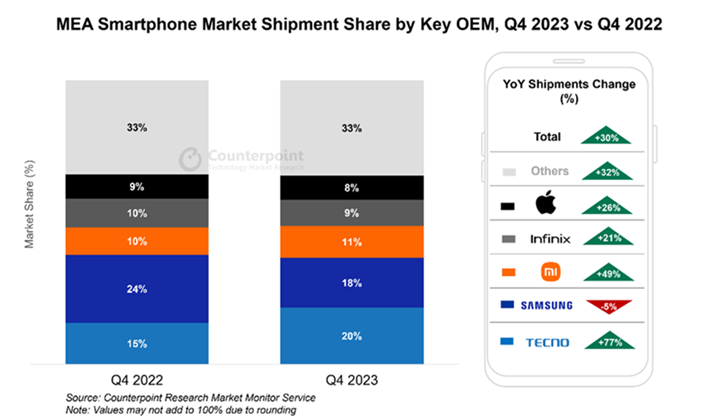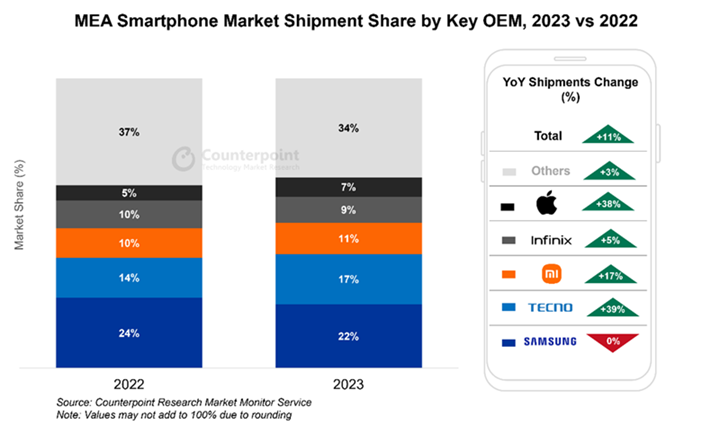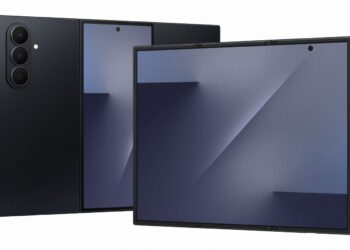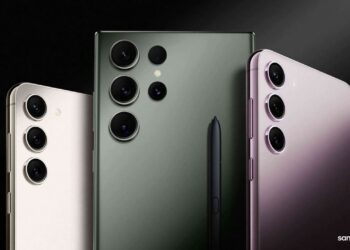The Middle East and Africa (MEA) smartphone market witnessed an impressive 30% year-over-year (YoY) growth in the fourth quarter of 2023. This marks the highest YoY growth globally during the period. According to Counterpoint Research, the recent economic recovery and rebounding consumer demand across the region have fueled this expansion.
The entire year of 2023 saw an 11% YoY increase in smartphone shipments, showcasing the improving economic status in the MEA region. The report points out that as inflation slowed, local currencies began to stabilize, and vendors successfully reduced high inventory levels through sales and discounts – all factors boosting consumer confidence in the smartphone market.
“MEA experienced remarkable growth, outpacing other regions due to the strong momentum since Q2 2023, as economies steadily recovered,” comments Senior Analyst Yang Wang from Counterpoint Research. “The popularity of smartphones, proliferation of digital services like mobile money and social media, big infrastructure projects, and the expansion of services sectors also proved to be key catalysts, disproportionately benefitting lower-income groups.”
Rightfully so, the report points out that the MEA region is rapidly embracing 5G technology with shipments growing 60% YoY in Q4 2023. The narrowing price gap between 4G and 5G devices and aggressive promotion of 5G models in lower price ranges are key factors in this growth.

A remarkable development is Tecno’s historic achievement. The brand surged 77% YoY, surpassing Samsung for the first time to become the region’s top smartphone vendor. In Q4 2023 alone (October to December 2023), Tecno captured 20% of the smartphone market share in Africa and the Middle East versus Samsung’s 18%. But despite losing 2% of the market share from the previous year, Samsung still managed to recover with 22% market share for the whole of 2023 compared to Tecno’s 17%. Tecno models like the Pop 7 and Camon 20 Pro in the sub-$150 (~ Kshs 22,000) price range were particularly popular, underscoring the company’s continued success in the African market. Xiaomi and Infinix captured 11% and 9% of the market share, respectively.
Apple is also establishing a stronger presence in key African markets, including South Africa, Nigeria, and Kenya. The report notes that Apple setting up key iPhone supply chains across these markets coupled with availability of promotional offers and smartphone financing options contributed to the company capturing a 7% market share in the MEA region, up from 5% the previous year. This echoes the MEA-wide trend of premiumization, with consumers increasingly gravitating towards high-end devices from Apple and Samsung.

This report highlights the undeniable influence of African consumers on the MEA smartphone landscape. Tecno, a brand well-known to Africans, has risen to dominate the region — a testament to the market’s power. As other brands further tap into Africa’s potential, the continent will undoubtedly continue shaping the future of the MEA smartphone industry.
You can check out the rest of the report here.












